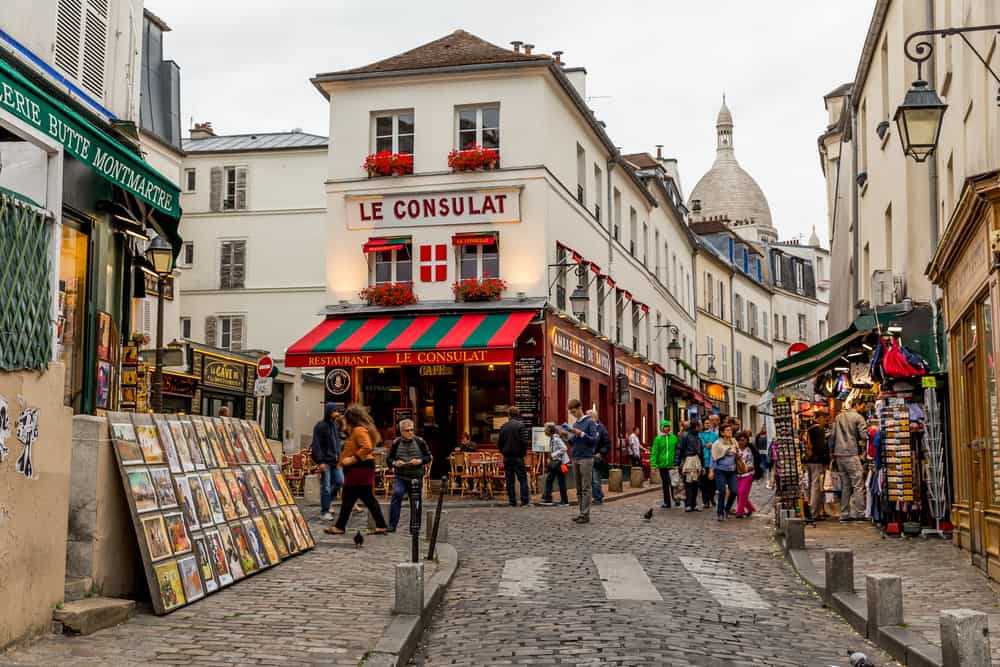In a lot of ways, French culture is very different from what you’re used to — even if you don’t realize it at first. From eating habits, to social norms, to mindsets and much more, here’s what you need to know about French culture if you’re going to be spending any time in France or around the French.
Over the years, I’ve written a bunch of posts on French culture, so let me round up everything I’ve covered for you into one big ol’ post.
French people & food

Photo credit: Shutterstock.com / Tatyana Vyc
The French love food and for good reason. They have some of the best food in the world and it’s serious business that’s worthy of a celebration. From wine and cheese to gastronomic delights, the French know a thing or two about food. If you visit France, you’ll want to be aware of some of the food-related norms so you don’t commit a faux pas or have any misunderstandings.
First, French meals tend to be strict in terms of timing and the French typically don’t snack. If you want to eat out at a French restaurant, especially outside of major cities that cater to tourists, be aware that lunch is generally served from 12-2 and dinner from 7 p.m. (sometimes not until 8) at the earliest. If you want to catch a late lunch or early dinner, you’re out of luck. It’s important for tourists to be aware of French mealtime norms. Also, take into account French tipping culture. The French don’t leave a 20% tip!
The one perfectly acceptable time to snack is the goûter around 4:30 p.m. Generally reserved for kids, the goûter is a sweet afternoon snack that holds their appetites over until dinner. Adults are welcome to indulge too. Things like a baguette with Nutella, some wafer cookies, or a pain au chocolat are common goûter options for kids in need of their afternoon snack.
If you’re invited to a French home, dinner will most likely not be served before 8 p.m. Yes, the French eat dinner later than most American households and the meal will have several courses. A few cheese options are normal — not considered something fancy or a special occasion — at the end of the meal. Most of the time, dessert is a must as well, but keep in mind it can be as simple as a yogurt or piece of fruit and isn’t a huge portion of cake or something similar. I nearly made a faux pas one Christmas with my soup choice. Not all dishes are seen in the same way they might be seen at home. Also, the French kitchen might be different than what you’re used to. Keep an eye out for a bread drawer. In fact, there are many differences between French and American homes including the building materials, the roof, and even the window shutters, for starters.
Something I noticed about French mealtimes is how important they are to the family unit. Meals are an experience and highlight of the day, not something to be rushed through and blown off as we multitask our way through the day. The French celebrate mealtime and delight in preparing good quality food. I talk about my favorite French mealtime habit here that we can all learn from. Even business lunches can be well over an hour and include a couple of courses and wine!
Also, it’s not a stereotype that a baguette is a must with every meal. French bakery culture is a topic of its own and it’s quite common to get fresh bread daily. Here’s some baguette etiquette to know. Most people get bread from the bakery and even the French grocery store has decent bread. When both of those options are closed, you can find baguette vending machines in some areas that make getting fresh bread a breeze. Keep in mind that bread is big business in France and there are so many different kinds. You don’t just call French bread, well, bread. French bread varieties have different names.

Photo credit: Shutterstock.com / Phovoir
French healthcare
France has universal healthcare and it is not connected to one’s job status. If you lose your job, you do not lose healthcare for you and your family. The French healthcare system is funded by the central government as well as employee/employer, and self-employed contributions. Everyone pays into the system, which consists of a network of public hospitals, private hospitals, doctors and other medical service providers. Services are much cheaper than in the USA, but keep in mind French healthcare is not free. I talk about French healthcare myths here.
Regular doctors’ visits cost 25 euros as of 2020 and you pay that at the appointment directly to the doctor. Citizens and permanent residents are then reimbursed 70% by the French social security system. For further reimbursement, many people pay for additional insurance called a mutuelle that provides extra coverage as well as options for dental care, eye care, etc. I’ve visited many doctors in France, including the gynecologist, and find them skilled and competent like doctors anywhere else in the world, but not everyone is a 10/10, which is normal. As a tourist, you can see a French doctor and pay French prices. The difference is you won’t be reimbursed like a French person would.
French pharmacies are huge parts of French healthcare and are marked by the big green flashy sign out front. They are all privately owned and aren’t part of large corporate chains like you’d see at pharmacies in the USA. I find the level of pharmacists’ competency second to none. They advise, treat, and listen to customers’ issues and recommend medicine and treatment. There are no untrained cashiers that work in the pharmacy. Everyone working in the pharmacy is trained, to some degree, in pharmacology. I find them excellent countrywide and very hands on, especially for a minor issue when a doctor’s visit can be avoided. Sometimes the pharmacy is a great place for a funny story too.
There’s a huge selection of non-prescription products and medications in the parapharmacie section (small pharmacies won’t have this), including cosmetics, skincare, and bath products, to name a few. Many of the beauty products have cult followings, although there are some weird French pharmacy products out there.
Speaking of beauty, hair salons are very popular in France and almost every shopping area has one. Town centers have several. Read this for my tips on getting a haircut in France. French women don’t get their nails done as much as Americans so nail salons are much less common in France.

Photo credit: Shutterstock.com / Jacob Lund
Social customs & etiquette
Public vs. private life
The French are often labeled arrogant by foreigners. Sure, while some French people might indeed be arrogant, like any group of people in the world, this label more often arises from not understanding French social customs.
There’s a very important concept that we must understand about the French and it’s one that took me years to fully grasp. It’s the difference between public versus private life and how regular American things, like small talk with a few seemingly normal personal questions, may be perceived differently in France. Conversation subject matter tends to be more open between American acquaintances, but personal topics — about family, where you’re from, where you’re going, etc. — are not the norm in France. Even if they’re curious, the French have a social rule that would tell them to hold back and not pry into something they consider one’s private life. These unspoken boundaries are strict and it would be unusual, even rude, to cross boundaries with strangers.
My husband tackled this topic in his Ask Tom Tuesdays column on social differences. He explains, “In France, Diane is sometimes annoyed about this aspect of French ‘manners’; it makes her upset sometimes that people don’t ask questions like where she’s going on vacation or follow-up questions after she says something — because it makes her think that people don’t care, whereas they’re just ‘respecting’ the boundary of private space. They’re just being polite by doing that! So while asking certain more private questions in France appears rude, it’s normal in the U.S. and even welcomed. Not asking those questions is seen as polite in France when it’d be almost proof of disinterest in the U.S.”
Social politeness
The French are quite socially polite and greet people in waiting rooms, in stores, and pretty much everywhere. If you don’t start off an interaction with a bonjour that lets others know you actually see them, it’s considered incredibly bad form and the French will let foreigners know. The greeting is one of the things tourists often forget when interacting with the French. There are all types of French politeness rules we need to take into consideration as well as polite French greetings. You say hello, thank you, and goodbye and make sure to always use the “vous” form of you for someone you don’t know.
When saying hello and goodbye in a social situation among friends or family, the expected and most common greeting is a cheek kiss. You can’t just show up to a small get-together at friend’s house and wave or just say hey. You acknowledge everyone in the room. To give a cheek kiss is called faire la bise and you generally give one kiss on each side of the face, starting right cheek to the other person’s right cheek (although sometimes this varies by region). Keep in mind the French do not hug to say hello. While you may find someone who prefers a hug, the cheek kiss is the default greeting.

That’s my dog Dagny
French pet culture
The French love their pets and you’ll see no shortage of dogs out and about, of all breeds, colors and sizes. Adopting pets from a shelter is common too. Well-behaved dogs are generally accepted at restaurants under the table as long as they don’t disturb other guests. This is especially true for outdoor seating. Many restaurants even bring out water bowls for their doggie guests.
In terms of veterinary care, it’s very easy to find a vet for your pet, even in smaller towns. Most cities have specialty clinics and 24-hour pet services for emergencies. Veterinary care has been comparable to the care my pets have received in the USA, although costs are significantly cheaper in France. I find French veterinarians to be less profit-focused and concerned with the business of being a vet and more personable and hands on, but that’s my personal opinion. I’m very happy with the care my dog Dagny has received in France.
One difference is that raw food diets for dogs in France, what my dog eats, are less common. Brands like Stella & Chewy’s, Primal, etc. don’t exist here and there are no mainstream French brands of dehydrated raw dog food or raw-coated kibble — yet. There are pet stores, like Maxizoo, which have all kinds of regular kibble and wet food options, though.
Despite what you’ve heard, French pet owners are making a little progress with picking up after their dogs. While dog poop can be a problem, especially in days past, many parks and public areas now have free waste bag dispensers to making picking up after your pet a no-brainer. You can easily buy waste bags at pet stores and online. That said, still watch where you walk because not everyone has caught on.
Let me make you aware of one last thing about pets in France. Something I knew nothing about until I moved here (since they don’t exist in the USA) is the danger of pine processionary caterpillars. If you have a pet, be aware of these pests and the problems they can cause.

Photo credit: Shutterstock.com / maziarz
The French enjoy life
Finally, a major French culture difference is that the French tend to have a slower pace of life and enjoy it. There’s a lot to learn from the French. As a whole, they aren’t as busy as Americans, always rushing around to the next thing and multitasking to do more and achieve more. The French are more relaxed. Take for example the fact that most stores and places of business are closed on Sundays and often during lunch. The everyday conveniences we might be used to aren’t available in France. The culture makes people slow down and it’s not about packing as much as you can into each day. The hustle culture isn’t as apparent and it’s probably for the best.
Also, vacation time is sacred to the French and all full-time employees legally get 5 week of paid vacation per year. There’s even a special name for the people who vacation in the summer months. It’s completely normally to take 2 or even 3 weeks off in a row during the summer — and still have a job to return to! Vacation time is a right in France and not a benefit from an employer. The French take time to just be. Life seems to not pass you by when you take the time to enjoy it.
***
What French culture differences have you found to be the most surprising and interesting?
PIN THIS FRENCH CULTURE POST:






Diane, this was one of your best blogs yet. Summary was beautiful. Thank you for the links within the articles.
I have been enjoying your videos as well, but don’t have understanding to “liking” on the actual site, since I do not have membership to the links.
Thank you gain for what you share.
bonne année,
pam
Hi Pamela, thank you so much for reading and your kind words. I’m not sure what you mean about having membership to the links? I want to try to help so please let me know… All of my content on my website and YouTube is 100% free so everything should be viewable. Thanks again
Another interesting and informative post
Recently, I had a minor ear infection. I live in Canada, but somehow I remembered what you said about the excellent training of pharmacists in France (you mentioned it here in this wonderful blog post too) and decided that instead of waiting two hours at the walk-in clinic, I would just speak to the pharmacist. And voilà, I followed the pharmacist’s advice, bought the drops she recommended and my ear is fine now. And it’s all thanks to you, Diane. Un grand merci !
BTW, I just need to repeat how much I love your blog. I probably won’t be back in France until the spring of 2021, so reading your blog helps me to stay in touch with France.
Oh wow, so happy the pharmacist was able to fix you right up! Before living here, if you told me ear drops from the pharmacist would fix the ear infection, I’d have said thanks but no thanks and gone to the doc. But I’ve learned there are more than one ways to get something done, especially when it comes to our health, so happy to hear you took the pharmacist’s recommendation and had great results! The mini “consult” was free and even though a doctor’s appointment is affordable, I’m sure the drops cost even less! And less hassle trying to get an appointment. Glad I was able to make that recommendation for you.
You’re so sweet. Thank you for the compliment. It feels so hollow typing “it means a lot. I appreciate it” but I really do. So happy I can bring you a little bit of France in the meantime until you can get back. 😉
France is such a beautiful country that I LOVE to visit. Some of the points you brought up about culture made me laugh a little, as I’ve had a few personal experiences with them. The cheek kiss instead of a hug greeting is one I’m still not used to.